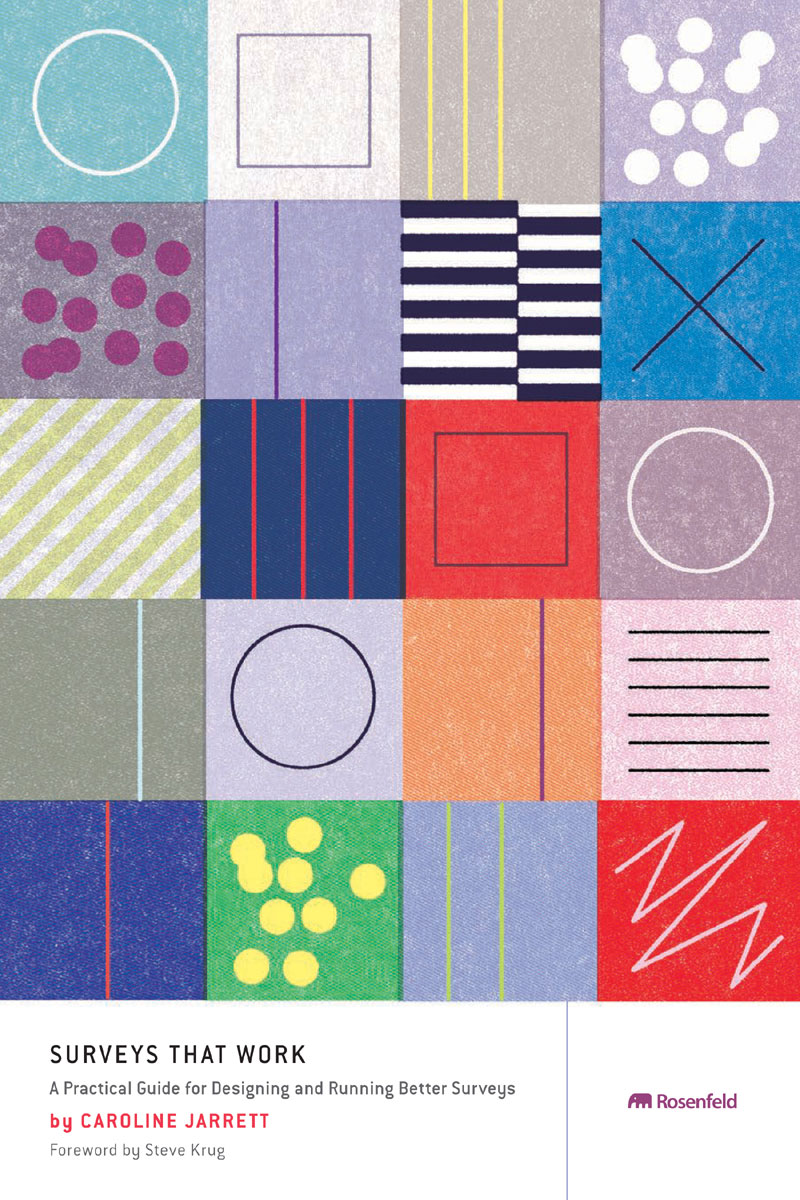Contents
SURVEYS THAT WORK
A PRACTICAL GUIDE FOR DESIGNING BETTER SURVEYS
Caroline Jarrett
Caroline has created a must-read one-stop source for those looking to conduct a survey. Her book guides the reader through all the necessary stages for creating a robust survey, from beginning to end. The book can be used by experienced survey methodologists looking to improve the surveys they run and by those who are new to the survey world. Refreshingly, its clear and simple language makes survey methodology accessible to the masses, and its practical approach supports this. Importantly, it also helps the reader work out whether a survey is indeed the right choicea step which is all too often overlooked. Helpfully, the book provides suggestions for additional reading for those who wish to explore particular aspects of survey design further. Read this bookand learn from one of the best.
Laura Wilson, Data Quality Hub Lead,
UK Office for National Statistics
Caroline Jarrett is the UX communitys foremost expert on conducting surveys. Now we have all of her considerable knowledge about surveys in one place. Her excellent book, Surveys That Work, covers everything from theory to process to what constitutes a good question to analyzing and understanding peoples answers. This practical book will answer all the questions you have about conducting surveys.
Pabini Gabriel-Petit, user experience expert,
editor of UXmatters.com
This book is a sharpening toolkit for taking haphazard surveys and making them useful. As research gets faster and faster, this book will help you keep pace with changing landscapes, especially in digital industries.
Akil Benjamin, Strategy Director, COMUZI
If surveys are one of the research techniques you use (or might use), you need this book! In an easy-to-read, conversational style, Caroline takes you through the entire process with wonderful examples, helpful stories, and tons of good advice. And where else would you have an adorable Survey Octopus to remind you of all the elements you need for a successful survey and of how to minimize the various problems that can impact the value of your results?
Janice (Ginny) Redish, author of Letting Go of the Words
Writing Web Content that Works
Those of us in the user experience design practice have needed this book for a long time. If you have avoided using surveys as a tool for understanding the needs of the people who use your products, shy away no more: Carolines mastery of method and her encouraging voice come through in every sentence. This book is a delight to read and use.
Dana Chisnell, Fellow, Belfer Center for Science and
International Affairs and Policy Designer, U.S. Digital Service
All praise for Surveys That Work and the Survey Octopus! This is crucial reading for all those who want to deepen their user-centered practice with quantitative research. A thorough exploration of all dimensions of the thinking process behind good surveys, this book will make you a better questioner!
Misaki Hata, Service designer, NHS Digital
This book is delightful; Im excited to share it with you. Caroline will help you know when to do a survey, and how to do it well. When we do good research, we can make good decisions!
Kathryn Summers, Professor, University of Baltimore
Surveys That Work
A Practical Guide for Designing Better Surveys
By Caroline Jarrett
Rosenfeld Media, LLC
125 Maiden Lane
New York, New York 10038
USA
On the Web: www.rosenfeldmedia.com
Please send errata to:
Publisher: Louis Rosenfeld
Managing Editor: Marta Justak
Interior Layout: Danielle Foster
Cover Design: Heads of State
Illustrator: Tasia Graham
Indexer: Marilyn Engst
Proofreader: Gill Editorial Services
2021 Caroline Jarrett
All Rights Reserved
ISBN: 1-933820-53-5
ISBN 13: 978-1-933820-53-8
LCCN: 2021931291
Printed and bound in the United States of America
For the National Health Service,
especially all the dedicated professionals
who got me through very serious illnesses.
Without them, I would not be here.
HOW TO USE THIS BOOK
Who Should Read This Book?
If you need or want to do a survey but dont know how, then this book is for you. I also hope youll find value in it if you are already doing surveys but feel that you could be doing better ones.
There are a few ways to use this book:
Read itstart at the beginning and keep going. It will take you through an entire survey process and a few specialist topics on the way.
If youre pressed for time and want to know what you can do quickly, turn directly to It has suggestions for things you can do when youve only got an hour to improve a survey, how to do a quick survey in a day, and how to plan your time when you have the luxury of a whole week.
Read the Introduction to get an idea of the seven steps to achieve an effective survey and then decide which of the steps sounds relevant to you and skip directly to that chapter.
If youre an academic or student and you want or need to dive into more details and follow up on the references, theres a section on the website for that as well.
What Comes with This Book?
The companion website for this book is effortmark.co.uk/surveysthatwork, or equivalently,  rosenfeldmedia.com/surveys-that-work.
rosenfeldmedia.com/surveys-that-work.
Youll find extra material, updates, diagrams, slides, and other supporting materials.
If youre a professor and considering whether this book is suitable for your students, theres a section on the website for you, too.
The books diagrams and other illustrations are available under a Creative Commons license (when possible) for you to download and include in your own presentations. You can find these on Flickr at www.flickr.com/photos/rosenfeldmedia/sets/.
FREQUENTLY ASKED QUESTIONS
I see so many bad surveysisnt the best survey the one thats not done at all?
Unfortunately, we are all bombarded with bad surveys. For example, someone in an organization decides that constantly blasting out questionnaires to every customer is a great way to get feedback. Their response rate is terrible, but they dont consider that this poor response will simply create lots of errorsand annoyed customers. And since these bad questionnaires go to everyone, youve got a very good chance of seeing too many questionnairesand many of them will be rotten ones.
A bad survey gets you bad data. A bad application of any method gets you bad data.
Whats the best survey tool?
Survey tools change constantly, so Ive learned not to make any specific recommendations. But I have written that has the crucial questions to ask when youre picking one.
When Im using a Likert scale, how many response points are best?
If you want a quick answer for the number of response points, 5 is good. If you want a more complex answer, skip to , which is a flowchart to help you decide on the number of response points.
And if you want my reasons for those answers, theres










 rosenfeldmedia.com/surveys-that-work.
rosenfeldmedia.com/surveys-that-work.